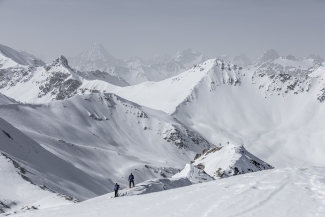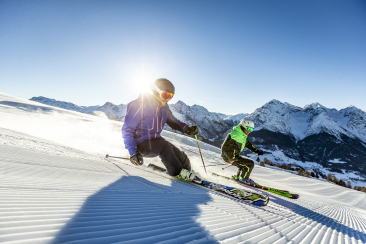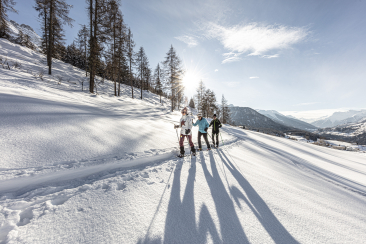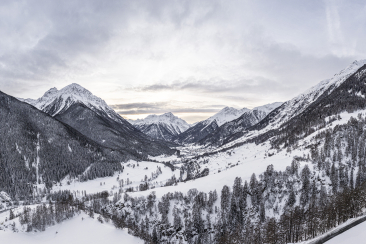Andri Poo
Mountain railway director with heart and mind
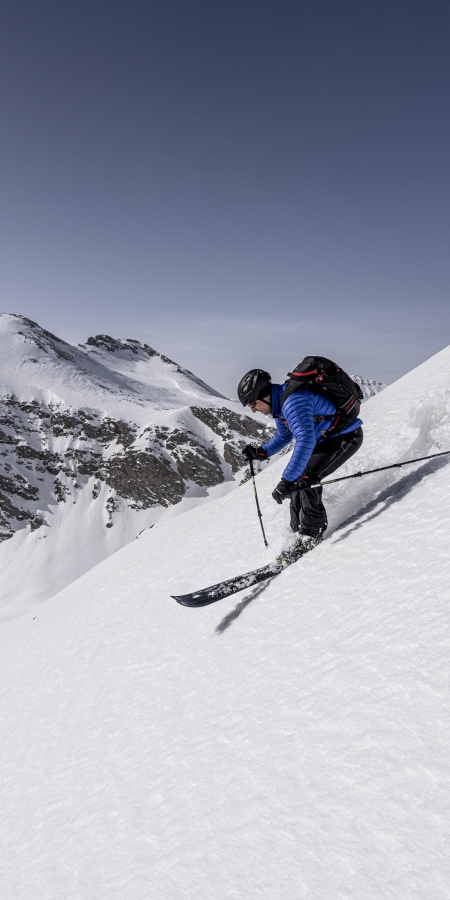
He elegantly lines up turn after turn in the soft snow. For Andri Poo, skiing is the most beautiful sport in the world. «I love the gliding, the rhythm, the speed – it's a unique feeling.» Today he has climbed the 2911 metre-high Piz Spadla on his touring skis. The fantastic descent leads directly to his home in Sent.
Skiing as a profession and vocation
Andri knows skiing from many perspectives: as a ski instructor, as head of training at Swiss Snowsports, as a mountain guide, as a board member of the local ski club and as director of Bergbahnen Scuol, his current professional position. He grew up in Sent and has strong roots in his homeland. In addition to his work as mountain railway director, the father of two daughters is involved in the cultural association and the SAC, and was also politically active as a local councillor.
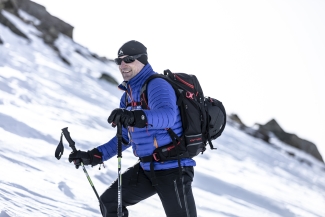
Protection and use of nature
«I decided to live and work here because the sustainable development of the region is important to me», says Andri. For him, sustainability means preserving and protecting nature, but also ensuring the economic and social well-being of the valley. As head of the mountain railways, which employ around 150 people in winter, he has a special responsibility in this area of conflict between protecting and utilising nature.
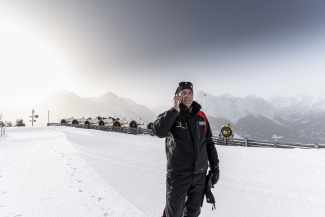
How to make snow efficiently
Technical snowmaking is a good example. As mountain railway director, a powerful snow-making system is important to him, while at the same time he pays attention to efficient and resource-saving processes. «It's about only producing as much snow as we actually need and processing the snow with as few piste machine hours as possible.»
We only produce as much snow as we actually need.
Snow management with GPS
This is why the Scuol mountain railways use a GPS-controlled snow management system. The snow groomer driver has a screen in his vehicle cabin that shows exactly how much snow lies between his vehicle, which weighs several tonnes, and the ground. Four sensors constantly measure the height of the snow groomer, the computer compares the measurement data with the topographical terrain images from the summer and can thus calculate the exact snow depth at any location in the ski area.
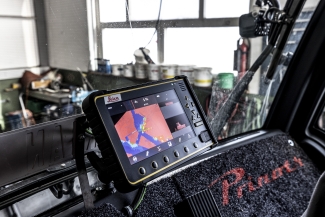
Save electricity, diesel and hours
«The system helps us to save electricity, water, diesel and labour hours. It is primarily a question of economic efficiency, but environmental considerations also play a role, of course.» Scuol has been using this system since 2013, as one of the first ski resorts in Switzerland. «The experience gained has been very helpful in optimising and expanding the snow system in recent years», says Andri, who has been Director since 2017. Around 55% of the piste area can now be covered with artificial snow.
We generate 92 per cent of our turnover in winter with skiing and snowboarding.
Winter business is well secured
A high level of snow reliability is of existential importance for the Scuol mountain railways. This is because around 92 per cent of transport revenue is generated in winter with skiing and snowboarding. And this winter dominance will not change significantly in the future, the expert is convinced - despite climate change. «We have a certain altitude in the ski area and are technically well positioned. The winter business is therefore secure. One unanswered question is with what goals we will renew the snowmaking system on the valley run; the system to Scuol is already 19 years old.»
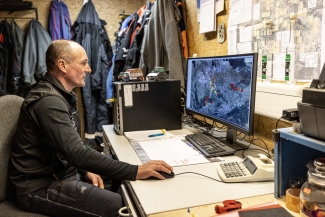
Preserving what we have
Of course, the mountain railway director is delighted when many guests also use the mountain railway in summer. But he remains realistic: «In a good summer, we might transport 60,000 guests, in winter it's over 300,000.»
Achieving growth at any price is a misconception.
It is also important to him that the mountain railways share the values of the Lower Engadine. «We want to offer guests authentic experiences close to nature.» Adventure parks to boost summer business are therefore not an issue for the mountain railways. That wouldn't suit us, says Andri. «Because we don't want to achieve growth at any price, we want to maintain what we have.»
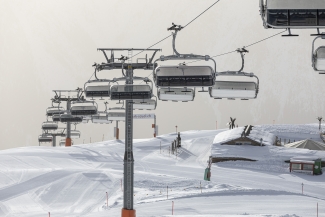
Appreciated good nature
Andri appreciates the versatility and family atmosphere of the ski area. «Our area has a certain good-naturedness that our guests appreciate.» His favourite piste is of course the «pista dal sömmi» – the dream piste to Sent. Because it is so beautiful and because it ends right in front of his home.
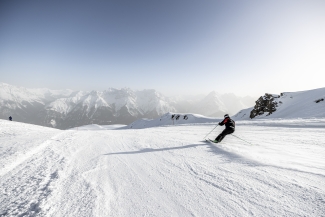
If possible, the boss goes up the mountain once a day to meet the head of the piste service or the catering hosts. He also likes to have lunch with the staff. «It's important for me to find out what's going well and where the problems lie.»
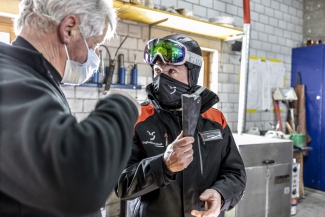
Win-win situation with agriculture
With his open approach to people, he has initiated a pioneering cooperation project with the farmers of Ftan. The idea: the farmers could use the reservoir and the snowmaking pipes to obtain water for irrigating their fields. In return, the mountain railways would receive more water to fill the reservoir naturally in autumn and winter. A win-win situation that benefits the environment: the mountain railways need less electricity to pump water up into the reservoir and the farmers do not have to build new water catchments for their irrigation system.
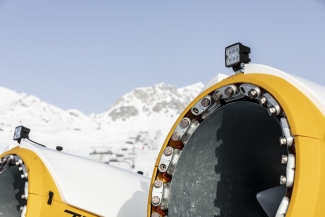
Utilising waste heat from the cable car motor
Andri, who worked as a civil engineer for many years, is always looking for optimisations to save energy and reduce CO2 emissions. He still sees a lot of savings potential in the utilisation of waste heat. The garages on Motta Naluns are already heated with the waste heat from the cable car engine, but the system is still not very efficient. This is another reason why Andri is pushing ahead with the new construction of the two restaurants La Motta and La Charpenna. This could not only enhance the catering experience, but also renovate the entire mountain station to make it more energy-efficient. If everything goes according to plan, the new restaurants will open in December 2024.
By far the greatest CO2 emissions associated with skiing occur during the journey to and from the resort.
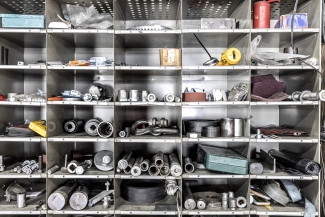
Support climate protection programmes
Avoiding food waste is also an important issue for the mountain railways. They also participate in climate protection programmes from Protect our Winters or myclimate. «We are open to such campaigns as they sensitise people to the CO2 problem. Many people don't realise, for example, that by far the biggest CO2 emissions associated with skiing occur during the journey to and from the resort.» The mountain railways therefore support projects that promote public transport.
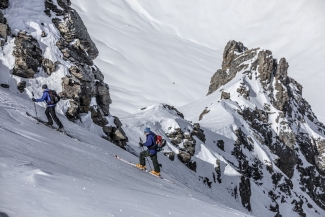
Walking to the office on touring skis
Andri also likes to do without his car from time to time and often skis to work. He sets off early in the morning when it is still dark. At 8.00 a.m., he is in the middle of the ski area at the Alpetta mountain restaurant, enjoying a coffee and discussing the day with his employees – Andri Poo has remained a nature lover and passionate skier, even as mountain railway director.
